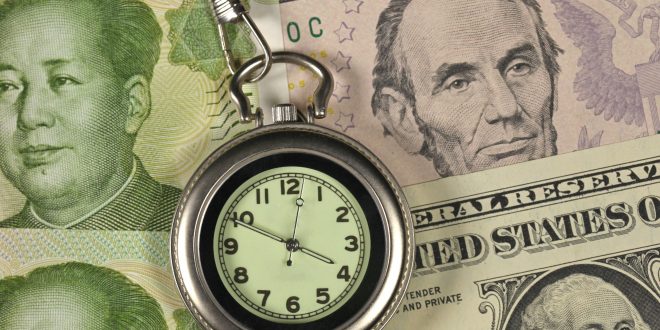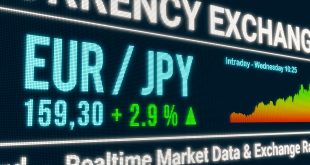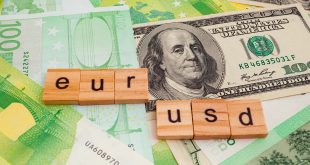2020 is drawing to a close as Brexit talks continue with the race to reach a deal between the European Union and the United Kingdom before December 31. On the other side of the ocean, US lawmakers are trying to fill loopholes in the massive stimulus bill that would provide funding to avoid a government shutdown.
Eurozone flash manufacturing PMI arrives at 55.5 for December vs. 53 expected. The Services PMI climbed to 47.3 for December as against 41.9 anticipated.
According to IHS/Markit research, Eurozone business activity came close to stabilizing in December as stronger manufacturing output growth helped to counter a further drop in service sector activity. In fact, the Eurozone manufacturing purchasing managers index (PMI) jumped to a 31-month high level of 55.5 during the reported month, up from 53.8 in November.
The flash version of the German Manufacturing PMI unexpectedly rose to 58.6 in December. The reading was well above consensus estimates pointing to a fall to 56.4 from 57.8 recorded in the previous month.
Meanwhile, the gauge for the services sector also surpassed market expectations but remained in the contraction territory, coming in at a two-month high level of 47.7 for December
The UK manufacturing and services sector activities showed mixed performance in December, the preliminary report from IHS Markit showed this Wednesday.
The seasonally adjusted IHS Markit/CIPS UK Manufacturing Purchasing Managers’ Index (PMI) jumped to a 37-month high level of 57.3 in December. The reading surpassed consensus estimates pointing to a modest uptick to 55.9 from 55.6 previous.
Meanwhile, the flash UK Services Business Activity Index for December remained in the contraction territory and came in at 49.9 versus November’s final reading of 47.6 and 50.5 expected.
The IHS Markit’s Manufacturing Purchasing Managers’ Index (PMI) for the US edged lower to 56.5 in December from 56.7 in November to show that the economic activity in the manufacturing sector continued to expand at a robust pace. This reading came in better than the market expectation 55.7.
On a negative note, the Services PMI fell to 55.3 from 58.4 in November and missed analysts’ estimate of 55.9.
The UK retail sales came in at -3.8% over the month in November vs.-4.2% expected and 1.2% previous. The core retail sales, stripping the auto motor fuel sales, stood at -2.6% MoM vs. -3.3% expected and 1.3% previous.
UK Employment numbers were a mix. Wage growth rose to 2.7%, up strongly from 1.3% beforehand. Unemployment claims jumped 64.3 thousand, which was much higher than the forecast of 10.5 thousand. As well, the unemployment rate edged up to 4.9%, up from 4.8% There were no surprises from the BoE, which made no changes to the Official Bank Rate of 0.10% or to QE. The bank was expected to remain on the sidelines while trade talks continue between the UK and the European Union
On an annualized basis, the UK retail sales rose by 2.4% in November versus 2.8% expected and 5.8% prior while the core retail sales increased by 5.6% in the reported month versus 4.1% expectations and 7.8% previous.
Private sector employment in Canada increased by 40,800 jobs from October to November, the ADP Research Institute revealed in its monthly report on Thursday.
On a negative note, the previous reading got revised down to -383,500 from -79,500.
US
US stocks closed lower Friday, December 18, affected by the uncertainty surrounding the stimulus package related to the Coronavirus, while Tesla shares reached an all-time high, supported by expectations of adding them to the S & P500 index next week.
Based on unofficial data, the Dow Jones Industrial Average fell 115.51 points, equivalent to 0.38%, to 30187.86 points, and the S & P500 index closed down 12.78 points, or 0.34%, to 3709.7 points, and the Nasdaq composite index fell 9.11 points, or 0.07%, to 12,755.64 points.
Europe
European stocks fell on Friday, December 18th, as doubts about a post-Brexit trade deal and a US stimulus package capped gains at the end of a strong week.
The pan-European STOXX 600 index halted a four-day rally, closing down 0.4%, erasing the gains that followed a sudden increase in German corporate sentiment in December.
The German DAX halted gains, which reached 0.8%, to close with a loss.
The British FTSE 100 Index, in which the shares of export companies constitute a weight, lost 0.3% despite the decline of the pound, after Britain and the European Union said that they are still different on a number of issues, and that the chances of them failing to reach a trade agreement before the end of December have become More likely.
In the United States, the chances of Congress agreeing to new Covid-19 aid worth $ 900 billion before the deadline recede, and may instead approve a third temporary spending package to prevent the government from shutting down.
Oil
Oil rose to its highest level in nine months Friday, December 18th, marking the seventh consecutive weekly gain, as investors focused on the distribution of Covid-19 vaccines and the decline of the US dollar this week.
Pfizer has applied for approval for its vaccine in Japan, which is being used in Britain and the United States.
US Vice President Mike Pence said approval of Moderna’s vaccine could take place later today. Brent crude settled up 76 cents, or 1.5%, to $52.26 a barrel, after touching $52.48, its highest level since March.
US West Texas Intermediate crude rose 74 cents, or 1.5%, to settle at $49.10 a barrel, the highest level since February. The US dollar recovered slightly today but remained near the two and a half year low it reached in the previous session.
The lower dollar makes oil and other commodities less expensive for holders of other currencies.
Oil was supported this week by US weekly supply data, which showed that crude inventories fell by 3.1 million barrels, a decline that exceeded expectations.
Baker Hughes Energy Services said in its document follow-up report on Friday that the number of oil and gas rigs, an early indicator of future production, increased by eight to 346 in the week ending December 18, the highest level since May.
.
Metals
Gold prices retreated as the dollar rebounded, after growing hopes of approval of stimulus in the United States led gold to rise for three days, putting the yellow metal on the path of achieving gains for the third week in a row.
Gold in spot transactions fell 0.1% to 1884.41 dollars an ounce before the Tokyo Stock Exchange closed. For the week, gold rose 2.4%. Gold in US futures slipped 0.1% to $1889.40.
Republican and Democratic lawmakers in Congress accelerated their efforts to approve a new round of aid to ease the fallout from the Corona virus on Thursday, while lawmakers from both parties said failure to reach an agreement was no longer an option.
The dollar index rose 0.2% , just over a little more than its lowest level in more than two years, reducing gold’s attractiveness to holders of other currencies.
Analysts say gold will be supported by the Federal Reserve’s pledge to continue its bond-buying program until “another major breakthrough” is made in restoring full employment and reaching its 2% inflation target.
As for the other precious metals, silver fell 1.1 percent to $ 25.77 an ounce. Platinum fell 1% to $ 1,033.67 and palladium rose 0.1% to $ 2,343.18, a rise of 0.8% for the week.
Currncies
The dollar exacerbated its losses, after a week of declining pushing it to its lowest level in two and a half years, as its decline attracted more short sellers seeking to make an easy profit.
The dollar index recovered during the session and rose in recent trading 0.2% at just under 90, but is still on track to record a 1% drop during the week.
The US currency reached its lowest level in more than two years at 89.723 on Thursday.
Analysts expect policy updates from central banks in the United States, Japan, Britain and Switzerland to have little impact this week to alter currency market trends in recent times and the long-term weakness of the US currency.
The Bank of Japan announced today that it will extend its loan program aimed at easing the repercussions of Covid-19 by six months and a surprise review of its policies to consider “another effective and substantial monetary easing”, which will be completed by March 2021.
The dollar rose half a percent against the yen to 103.959 yen, but was still down 0.5% against the Japanese currency for the week.
The pound gave up some of its gains against the dollar and the euro as tough talks continued on a post-Brexit trade deal between the UK and the bloc.
Bitcoin was trading at about $ 23,000, after it rose to an all-time high on Thursday.
Coronavirus
Global infections with the Coronavirus exceeded 75 million cases on Saturday, December 19, according to a Reuters count.
At the same time, several countries around the world began vaccination campaigns against the virus.
This month, Britain became the first Western country to start vaccinations with the Covid-19 vaccine developed by Pfizer and its German partner Biontech, followed by the United States, which also approved a vaccine from Moderna.
18 million and 650 thousand new cases of Coronavirus were recorded last month, the highest number recorded during the 30-day period of the outbreak of the epidemic.
Europe is still the region with the largest number of cases, with 21 million and 600 thousand cases, followed by North America with 17 million and 900 thousand, Latin America with 14 million and 500 thousand, and Asia with 13 million.
Europe recorded one million new cases in just five days.
On Monday, the United States became the first country in the world in which the number of deaths due to coronavirus panedmic exceeded 300,000 cases.
 Noor Trends News, Technical Analysis, Educational Tools and Recommendations
Noor Trends News, Technical Analysis, Educational Tools and Recommendations





